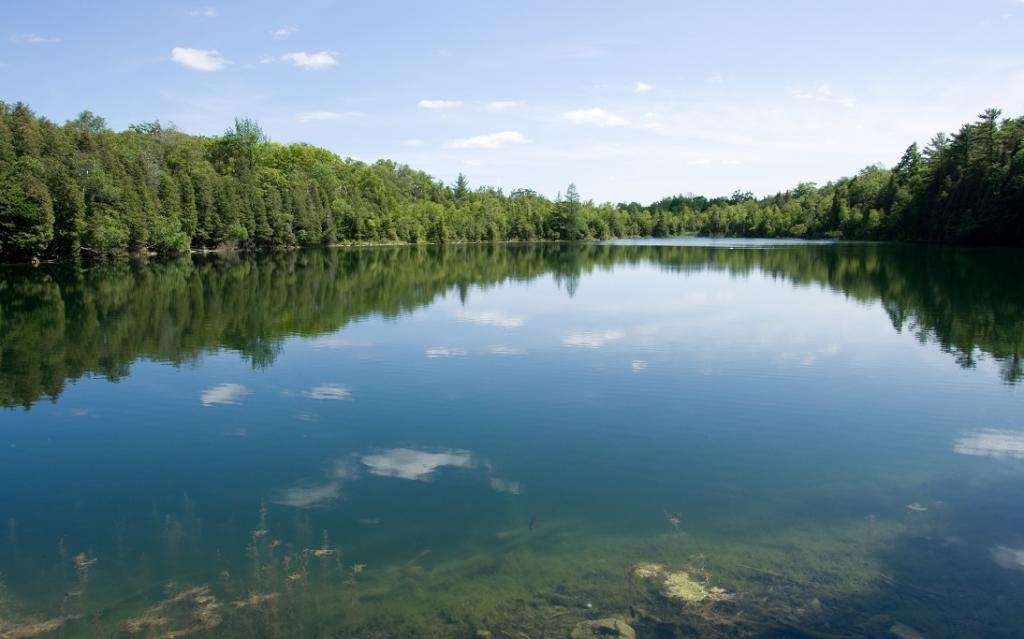Description

Disclaimer: Copyright infringement not intended.
Context
The proposal made by the Anthropocene Working Group (AWG) regarding the starting date of the Anthropocene epoch.
Details
- The Anthropocene Working Group (AWG) proposes that the Anthropocene epoch began around 1950.
- The term Anthropocene refers to a new geological epoch characterized by the profound impact of human activities on Earth's systems.
- The starting date is based on evidence from Crawford Lake in Canada's Ontario Province.
Evidence from Crawford Lake
- Crawford Lake near Toronto, Ontario, provides a unique reference point for determining the start of the Anthropocene.
- Sediments from the lake show an increase in the concentration of plutonium particles around 1950.
- The presence of plutonium serves as a clear indication of human impact and supports the hypothesis of the Anthropocene era.
AWG's Findings and Proposal
- The AWG estimates that the Anthropocene epoch began between 1950 and 1954.
- The analysis of Crawford Lake's sediments reveals a clear shift from the mid-20th century, marking the transition beyond the Holocene epoch.
- The proposal will be voted on within the scientific community, and if approved, it may be ratified by the International Union of Geological Sciences.
Anthropocene Epoch and Human Impact
- Climate Change: The release of greenhouse gases, primarily carbon dioxide, through human activities has resulted in global warming. Rising temperatures, melting ice caps, sea-level rise, and extreme weather events are some of the consequences of climate change.
- Biodiversity Loss: Human activities, including habitat destruction, pollution, and the introduction of invasive species, have accelerated the rate of species extinction. Loss of biodiversity has far-reaching implications for ecological balance and ecosystem functioning.
- Land Use Change: Expanding agriculture, urbanization, and infrastructure development have led to significant land use changes. Deforestation, conversion of natural habitats to farmland, and urban sprawl have resulted in the loss of natural ecosystems.
- Pollution and Contamination: The widespread release of pollutants, such as air and water pollution, chemical contaminants, and plastic waste, has contaminated ecosystems. Human activities have introduced pollutants that persist in the environment and have adverse effects on both wildlife and human health.
- Altered Biogeochemical Cycles: Human activities have disrupted natural biogeochemical cycles, such as the carbon, nitrogen, and phosphorus cycles. Excessive release of carbon dioxide, nitrogen and phosphorus fertilizers, and other pollutants has led to imbalances in these cycles, affecting ecosystems worldwide.
- Technological Advances: Technological advancements have further accelerated human impact on the environment. Industrialization, mechanization, and the extraction of natural resources have increased the scale and speed of environmental changes.
- Global Scale Changes: The impact of human activities is not confined to local or regional scales but has global implications. The interconnectedness of Earth's systems means that changes in one part of the world can have cascading effects on other regions.
Controversies and Further Steps
- There are disagreements within the scientific community regarding the reality of the Anthropocene epoch and its exact starting point.
- The AWG plans to present a proposal to the International Commission on Stratigraphy (ICS) for approval.
- The final decision on the Anthropocene epoch may come at the 37th International Geological Congress in 2024.
Earth's Geological Time Scale
- The Earth's geological time scale categorizes time into eons, eras, periods, epochs, and ages.
- The Anthropocene epoch, if officially recognized, would become a new addition to the geological time scale.
- The Phanerozoic eon, Cenozoic era, Quaternary period, Holocene epoch, and Meghalayan age represent the current divisions of geological time.
|
PRACTICE QUESTION
Q) Examine the significance of the Anthropocene in understanding human impact on Earth's systems and its implications for environmental challenges. (150 words)
|

https://www.downtoearth.org.in/news/science-technology/world-past-holocene-epoch-anthropocene-began-in-1950-say-scientists-90588
https://indianexpress.com/article/explained/explained-sci-tech/anthropocene-epoch-meaning-significance-8831445/














